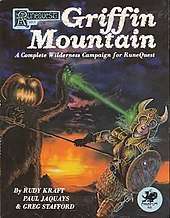Griffin Mountain
Griffin Mountain is a supplement published by Chaosium in 1981 for the fantasy role-playing game RuneQuest.

Contents
Griffin Mountain is a wilderness campaign setting for the RuneQuest system, focussed on the city of Balazar amidst the Elder Wilds.[1] Various chapters of the book give background on the world of Glorantha; the citizens and leaders of Balazar; caravans and how the players might interact with one; how to obtain information, ranging from lies and wild rumours to the truth; how wilderness encounters can be set up; and "points of interest", which can be used as starting places for adventures.[2]
Reception
Eric Goldberg reviewed Griffin Mountain in Ares Magazine #10 and commented that "Griffin Mountain is not just better because it is bigger. Messrs. Kraft, Jaquays and Stafford have created a campaign which demonstrates, by example, what a gamemaster should prepare for a serious role-playing campaign."[3]
Murray Writtle reviewed Griffin Mountain for White Dwarf #27, giving it an overall rating of 9 out of 10, and stated that "This is an exemplary work, full of imagination, clear thought and hard work. It contains much material relevant not only to itself or for a single use, but to many situations and for repeated use. In short, it's a labour of love and a must for all Glorantha-orientated RuneQuest umpires."[4]
David Dunham reviewed Griffin Mountain in The Space Gamer No. 48.[1] Dunham commented that "Griffin Mountain represents the state of the art in published scenarios. It's more than a soulless listing of characteristics or a collection of disjointed encounters. I highly recommend it to all RuneQuest referees, and to anyone who wants an example of how a campaign should be set up."[1]
In the February 1982 edition of Dragon (Issue #58), Bill Fawcett was impressed by the amount of material provided, saying, "The 200-page supplement is packed with more information than some role-playing systems contain in their entirety." He was also thankful for the indices, which made looking up specific information quite easy. His opinion was that the book was "generally well written and clear to anyone familiar with RuneQuest", but he did warn new players that this probably was not the setting to start with, since "Even a good player with an experienced character is challenged and in dire straights [sic] fairly often." Fawcett concluded that for experienced RuneQuest players, "you may not be able to resist this offering. If you are new to RuneQuest, it may prove a bit much for your character, but the background alone make interesting reading."[2]
Other reviews
- Adventurer #4 (Oct., 1986)
References
- Dunham, David (February 1982). "Capsule Reviews". The Space Gamer. Steve Jackson Games (48): 30.
- Fawcett, Bill (February 1982). "The Dragon's Augury". Dragon. TSR, Inc. (58): 68.
- Goldberg, Eric (September 1981). "Games". Ares Magazine. Simulations Publications, Inc. (10): 30.
- Writtle, Murray (October–November 1981). "Open Box". White Dwarf. Games Workshop (Issue 27): 11–12.CS1 maint: date format (link)